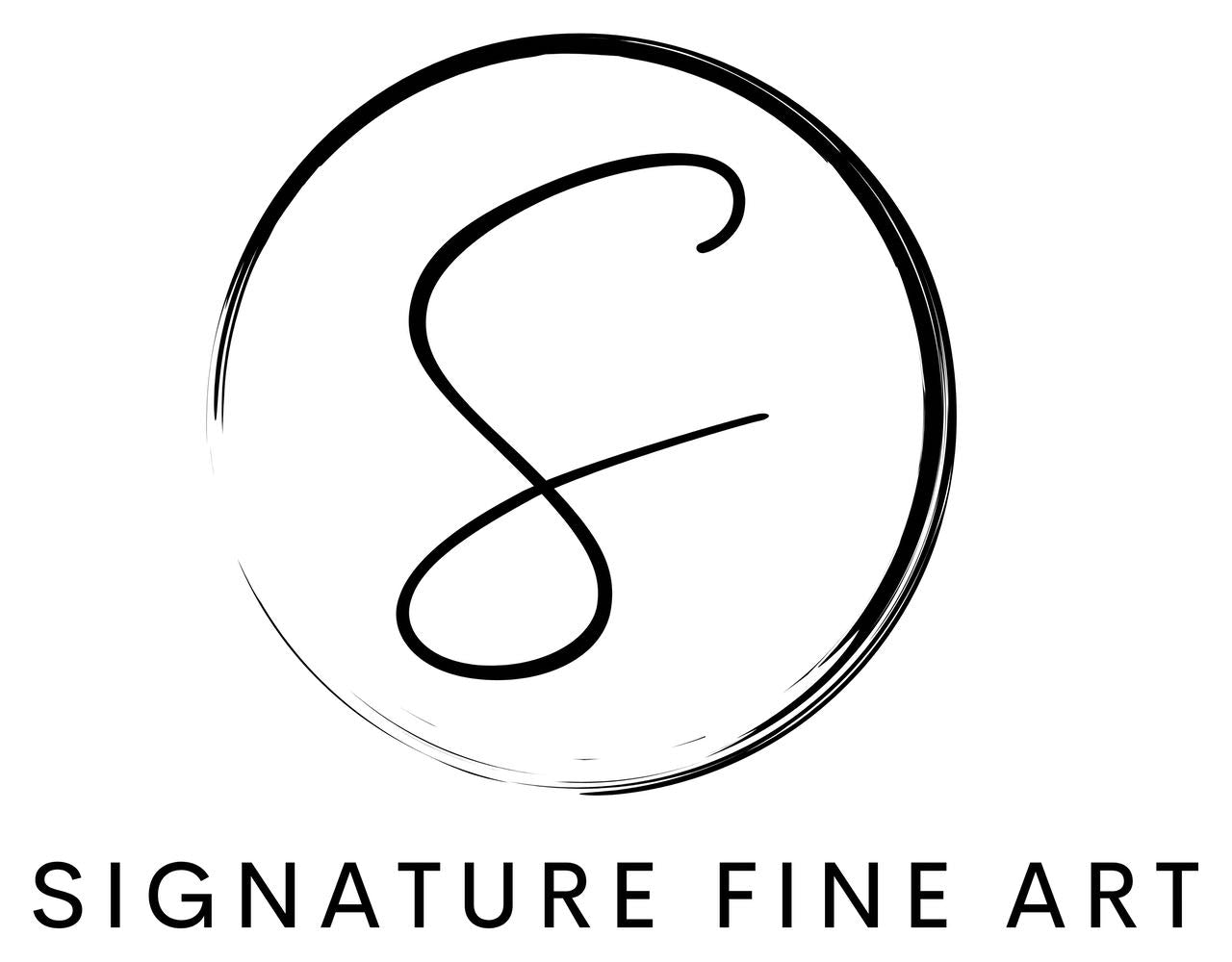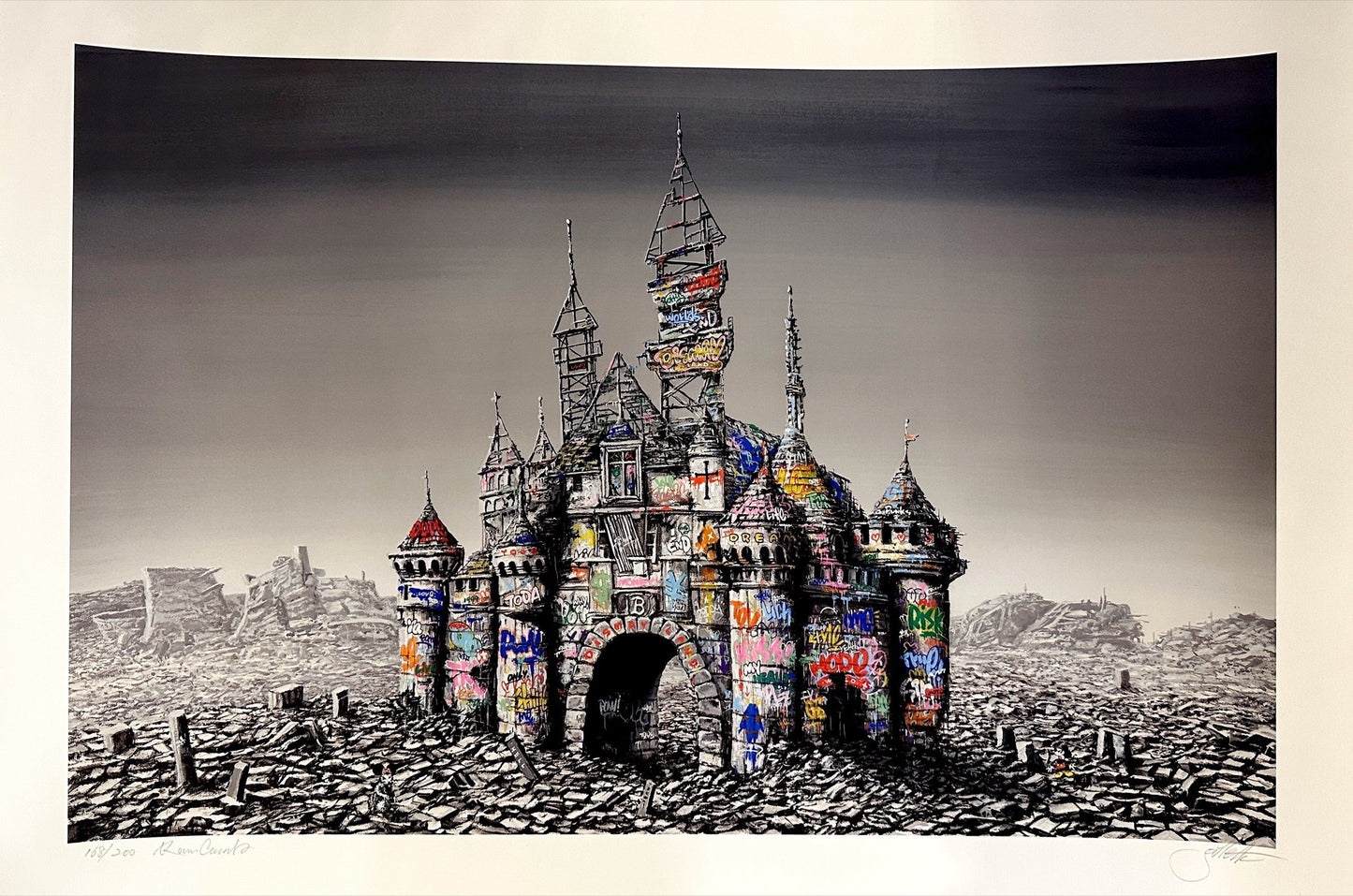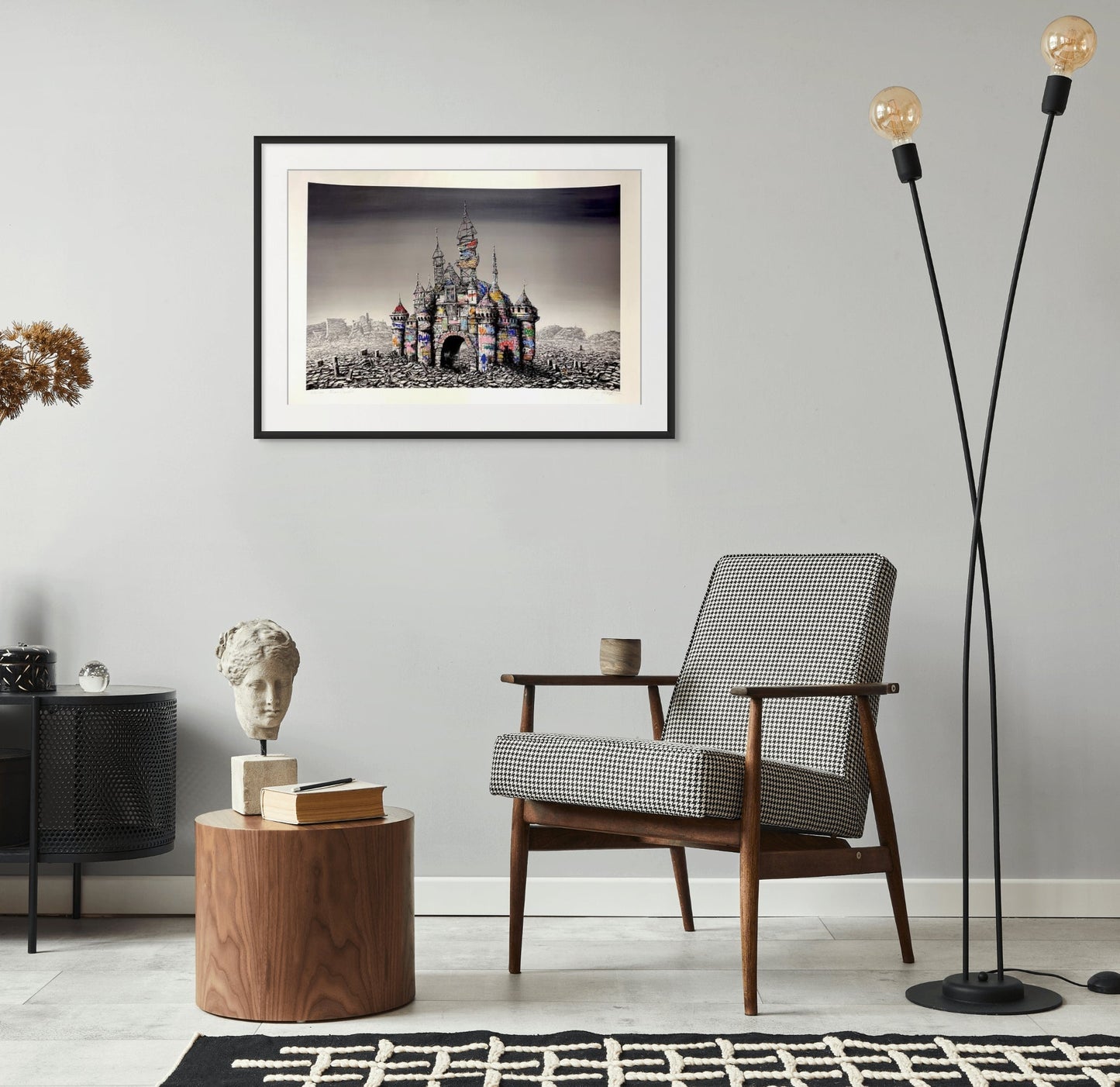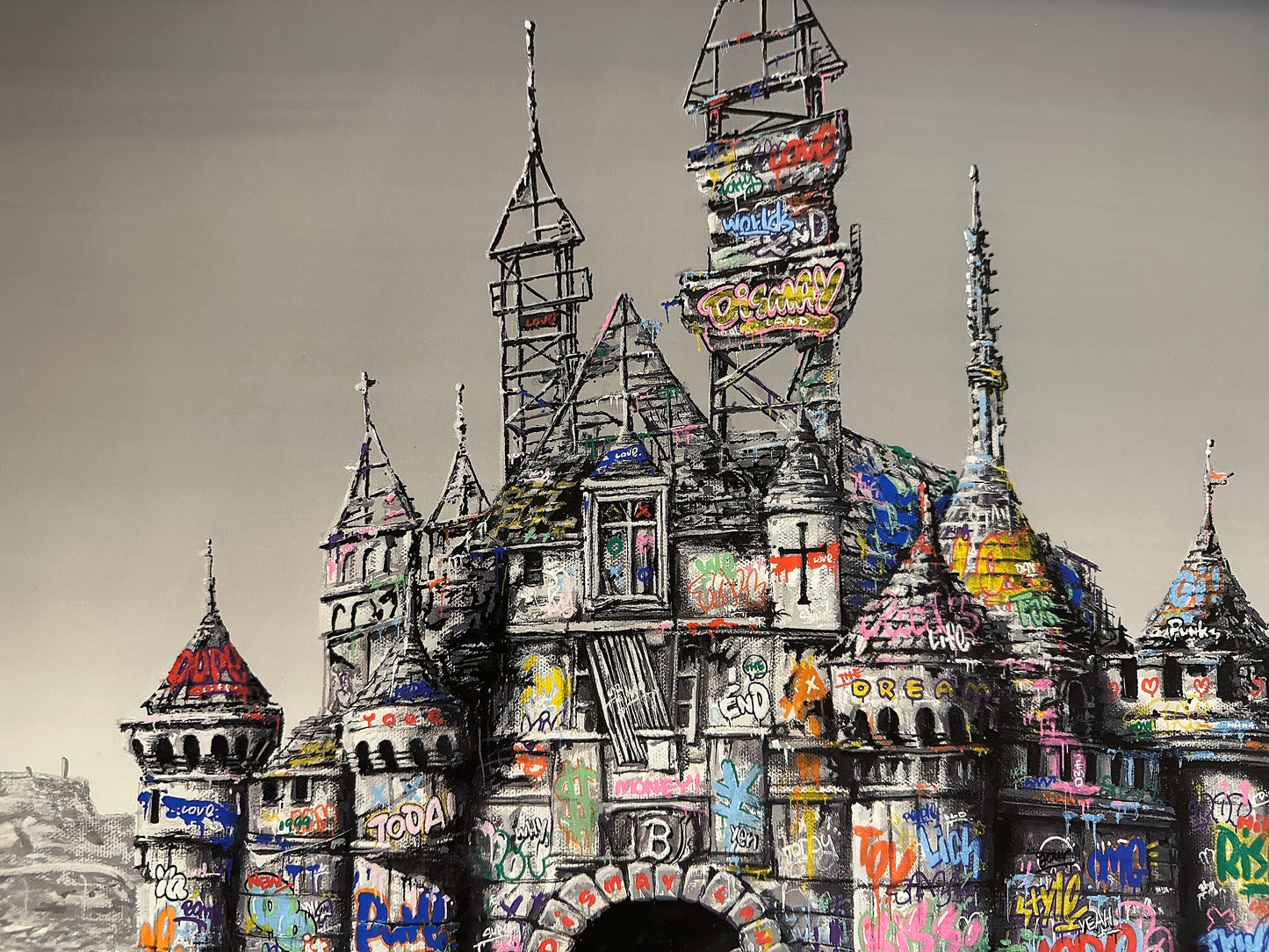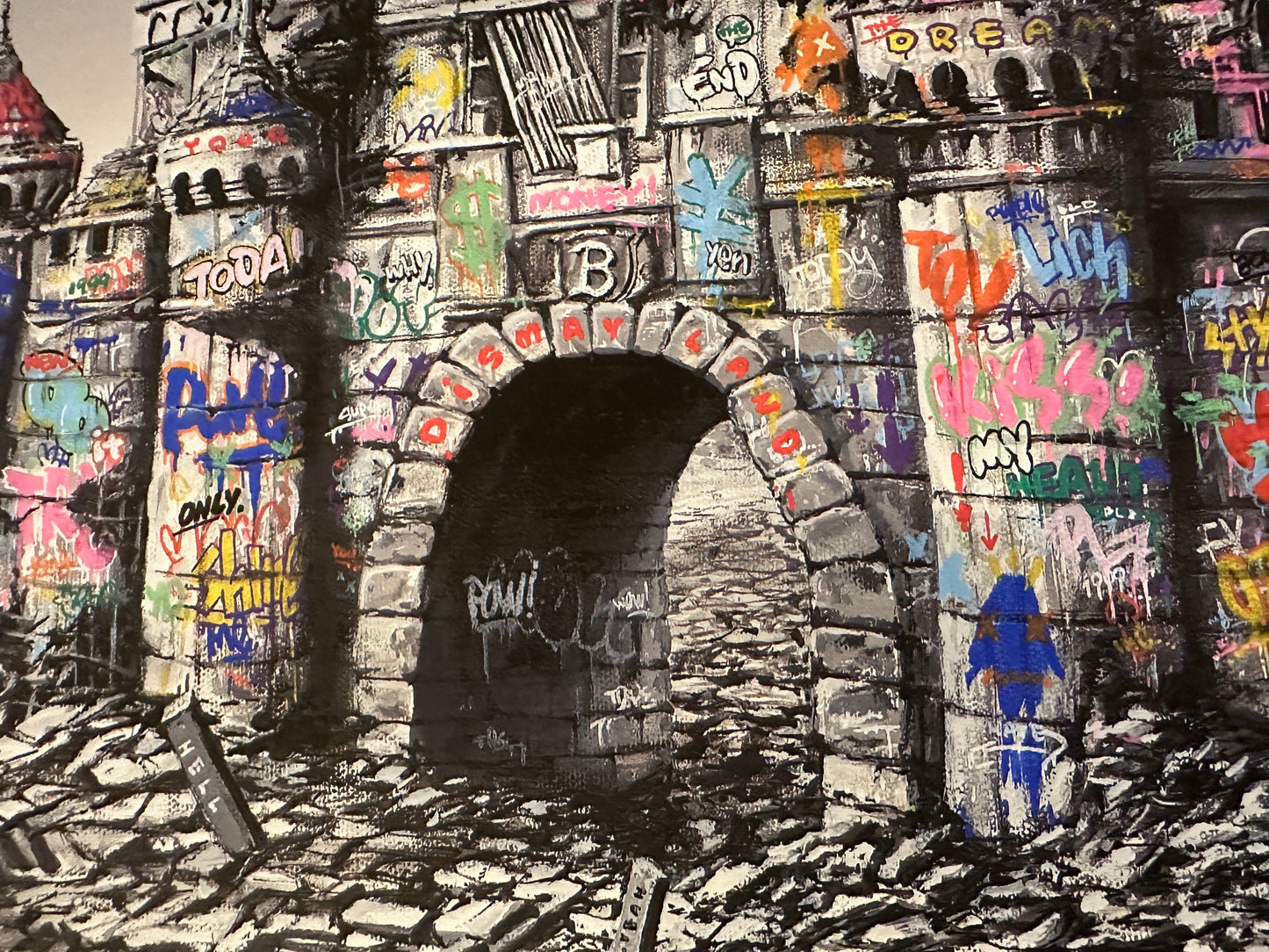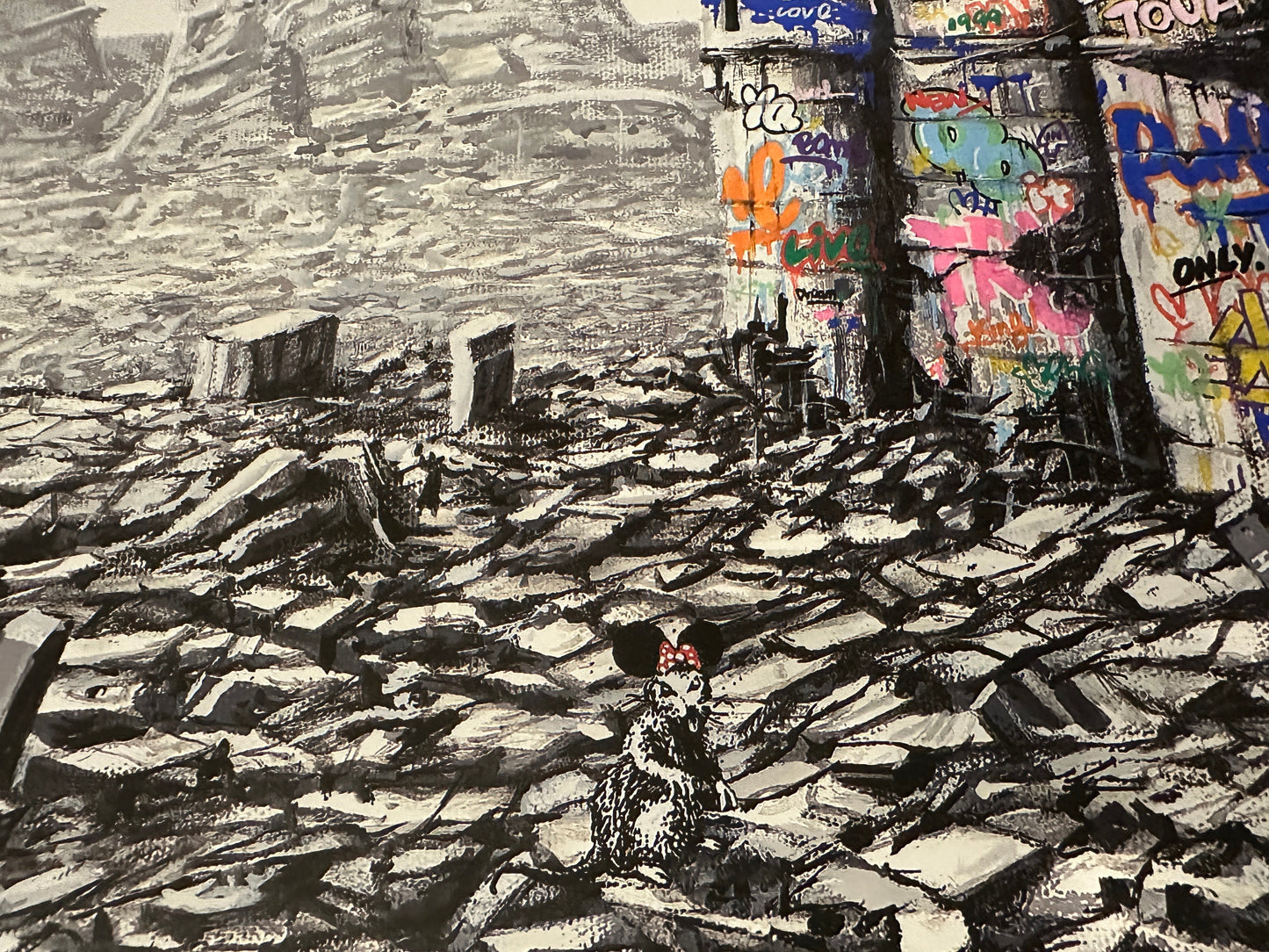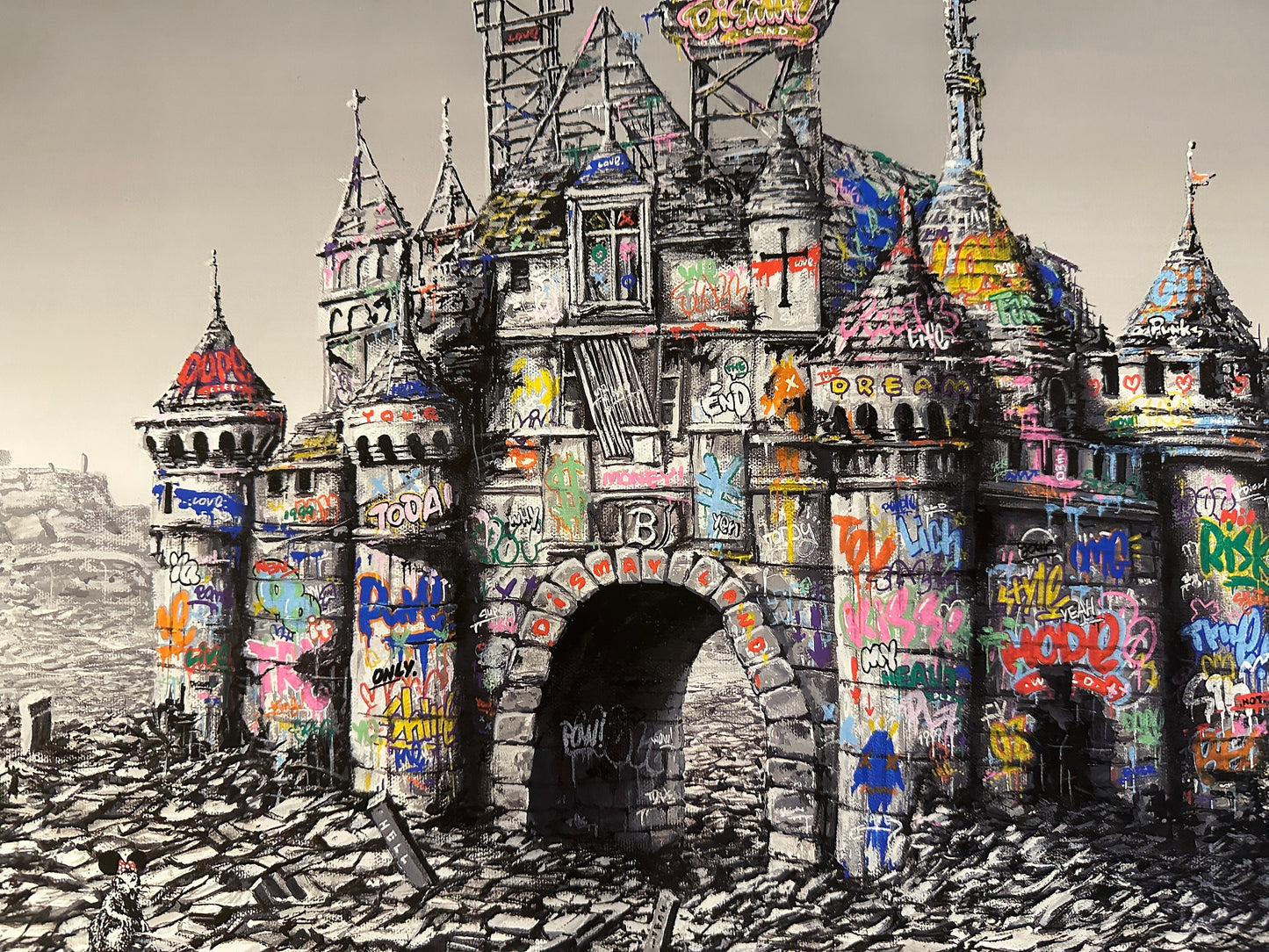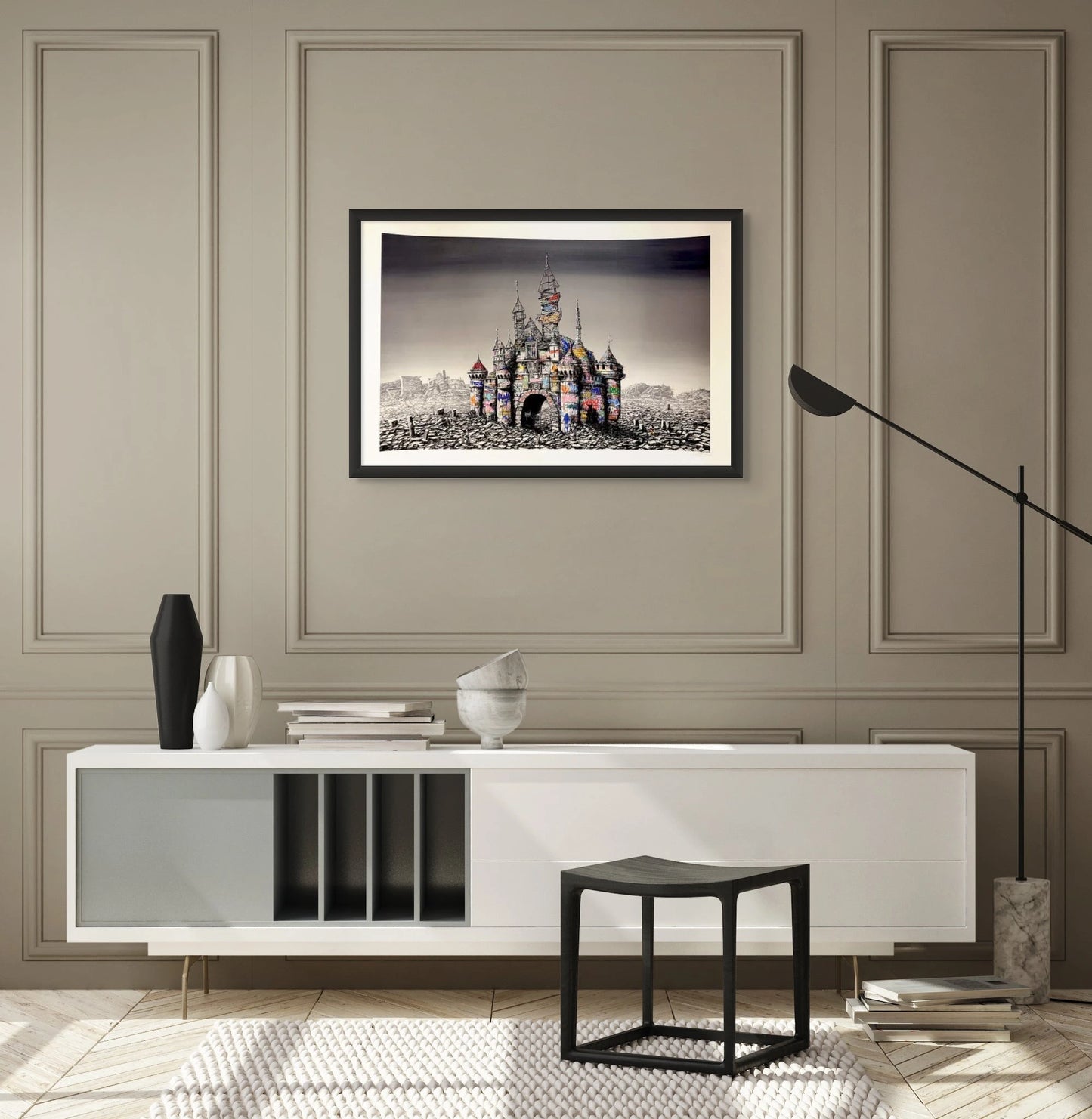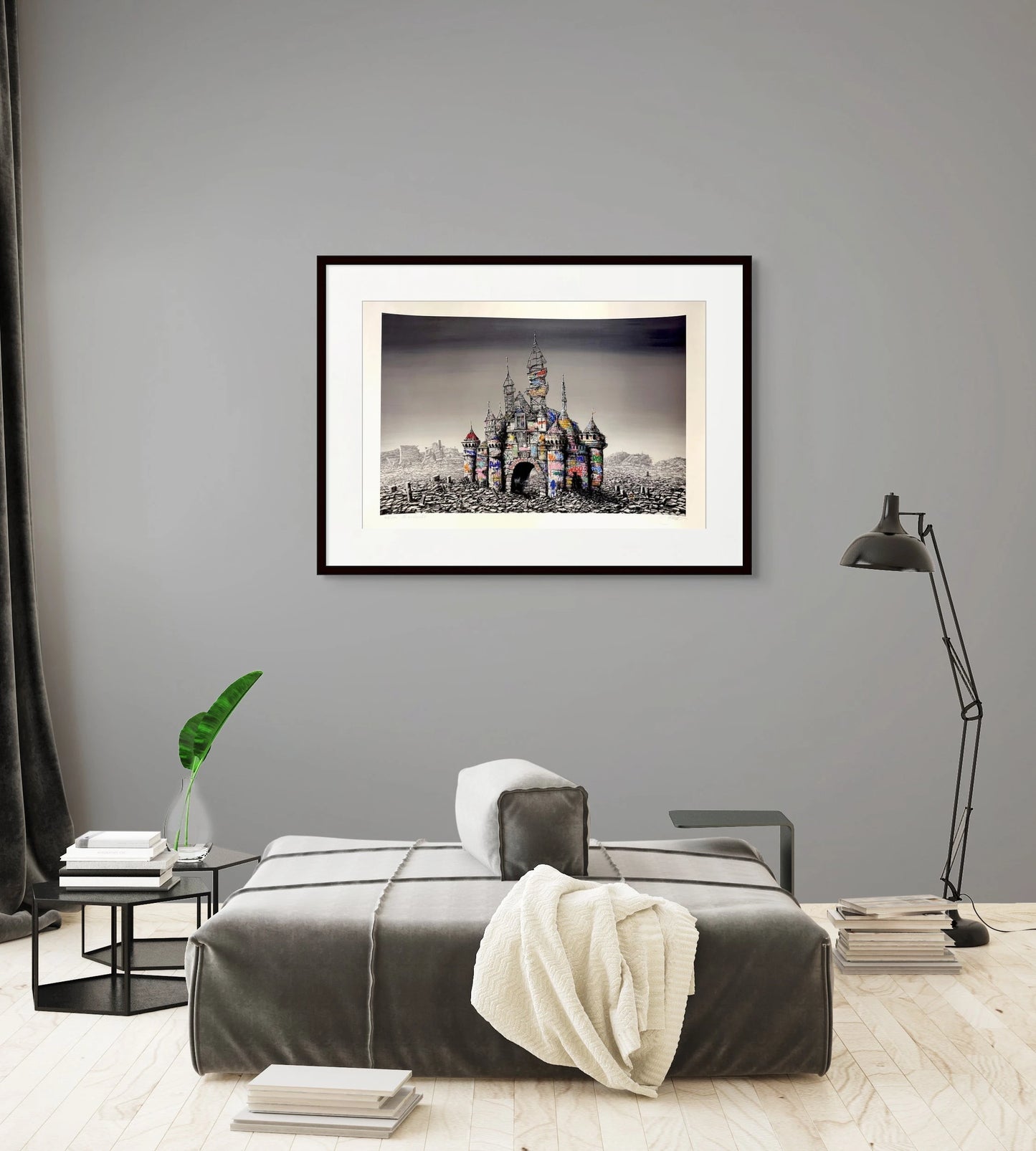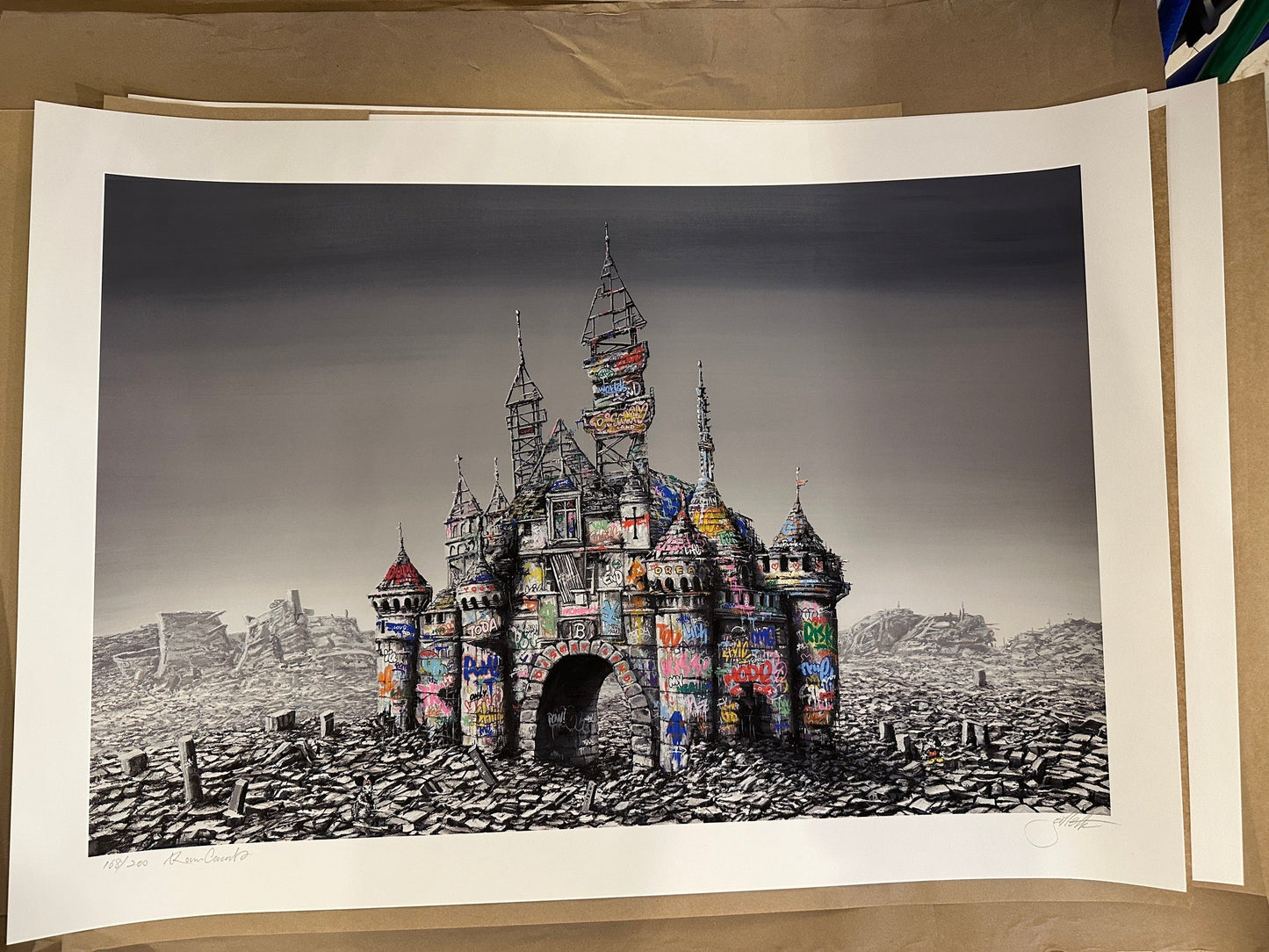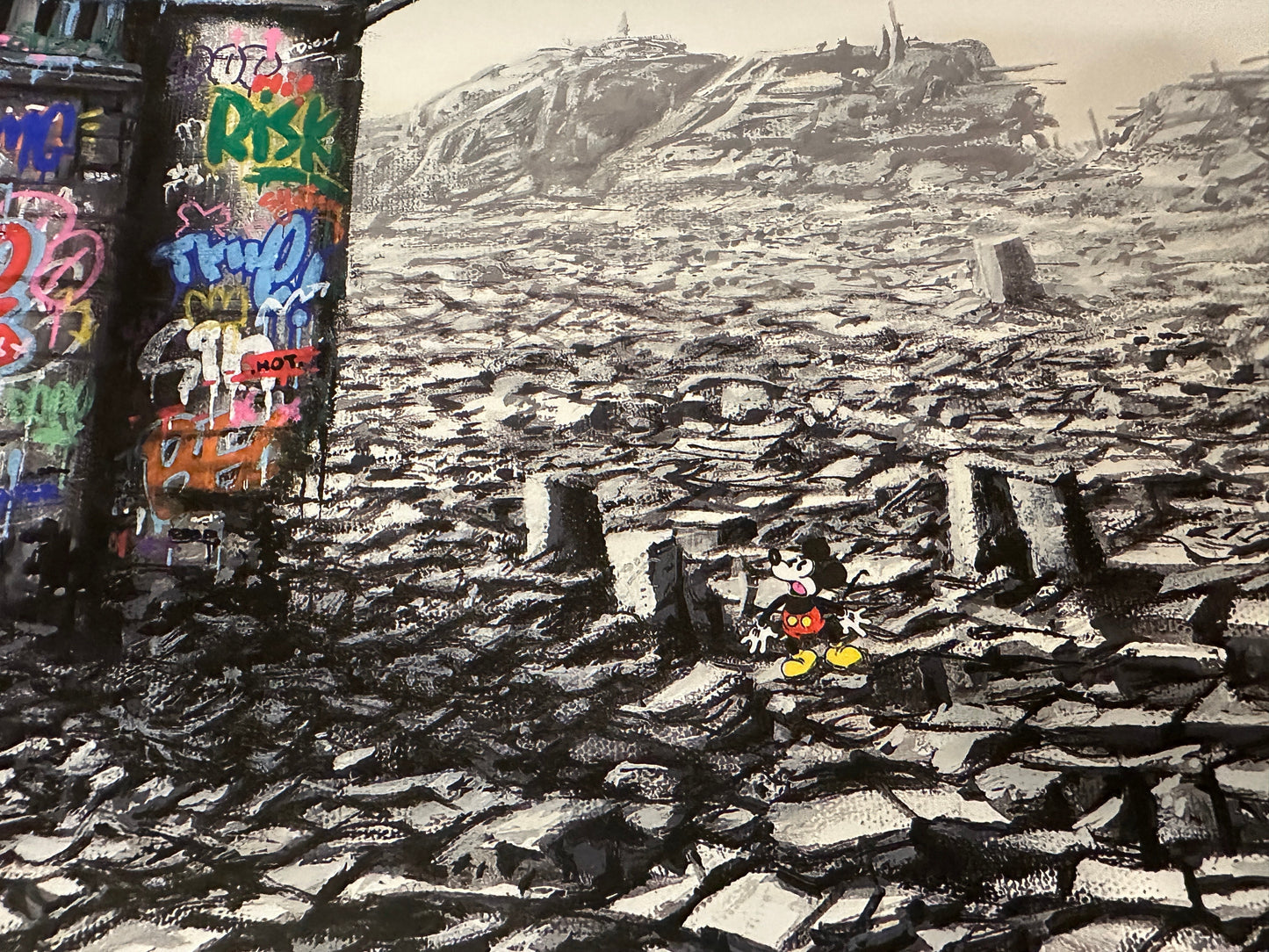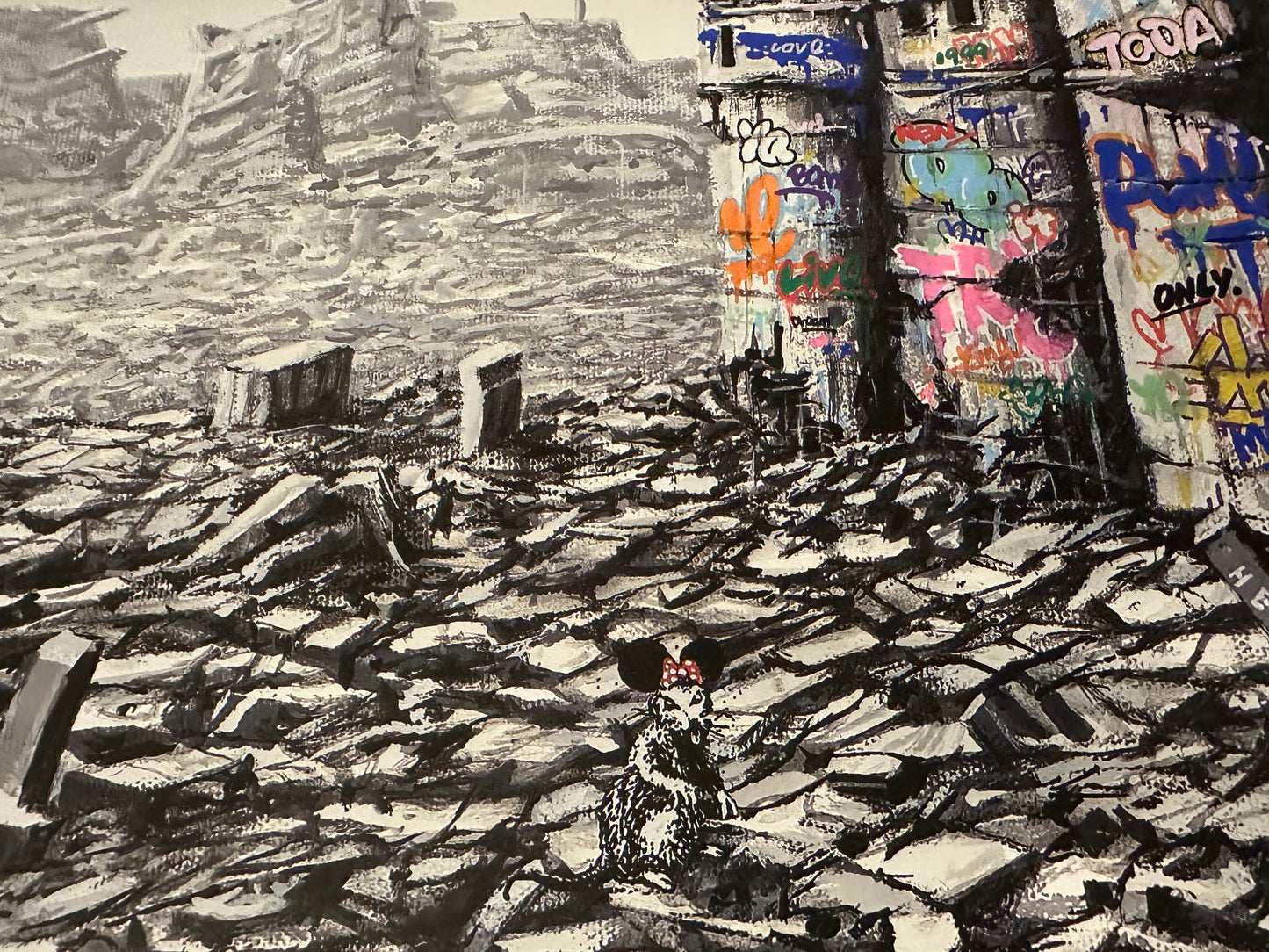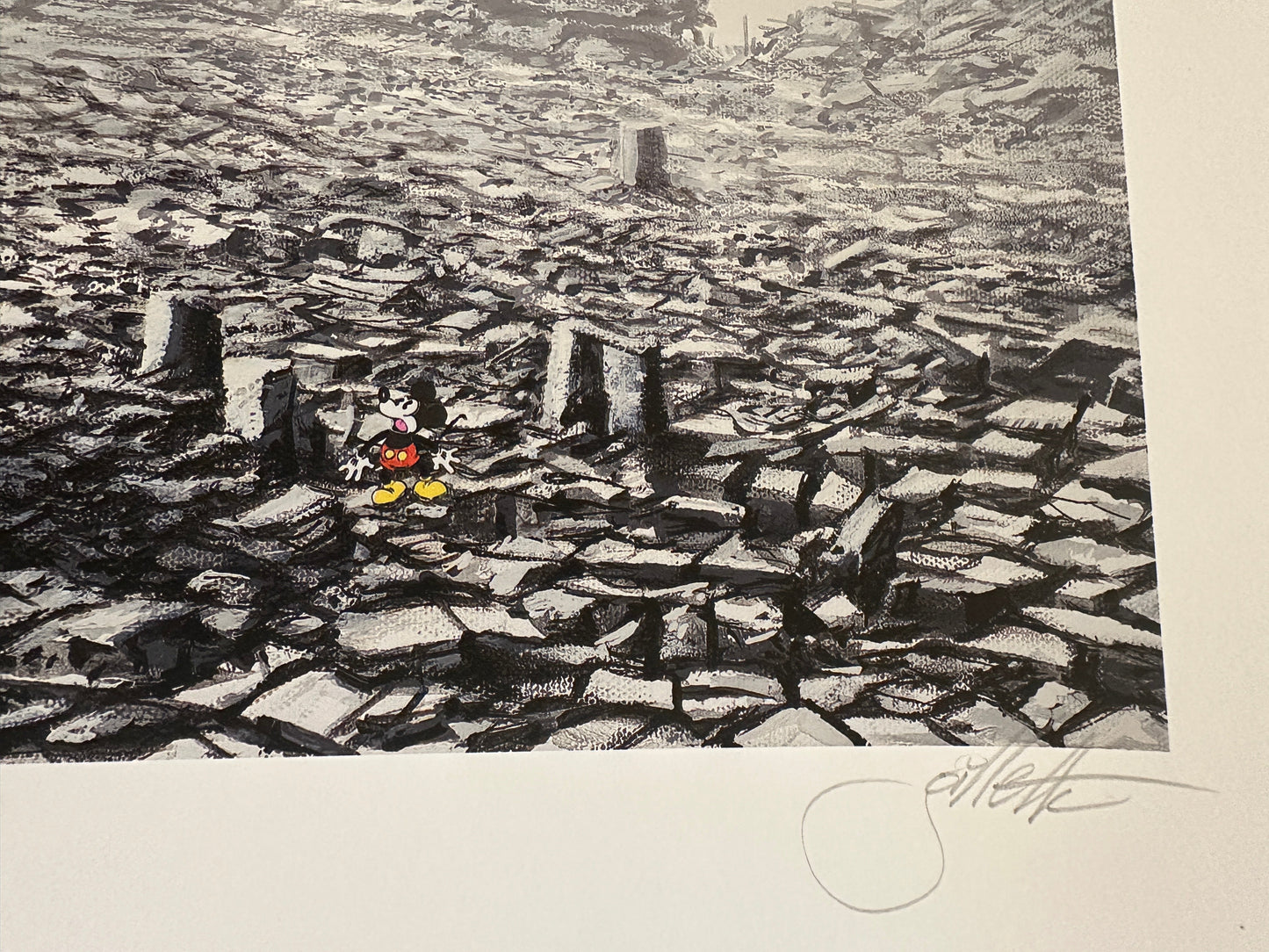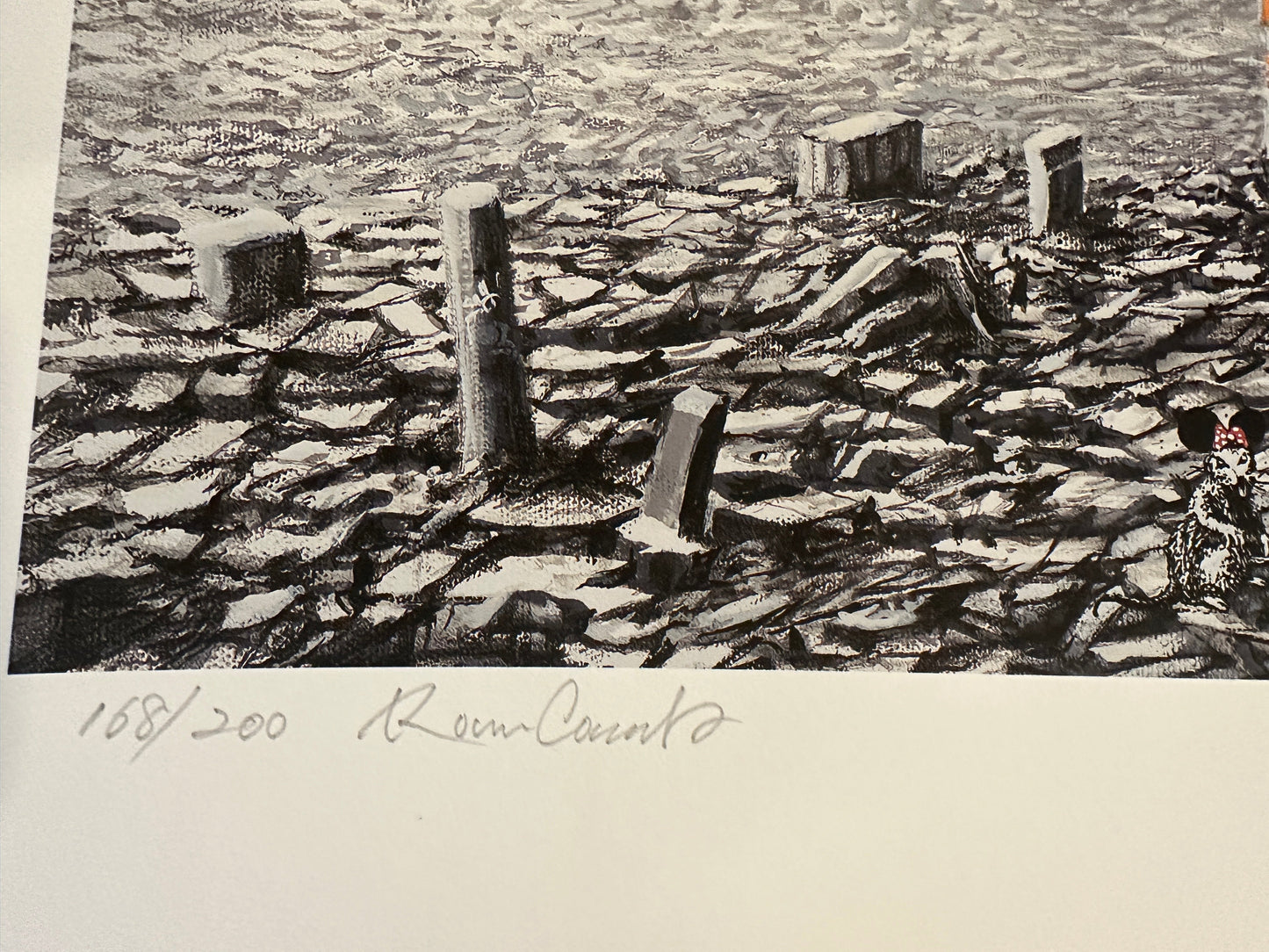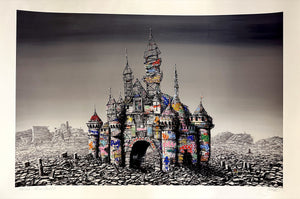Dismaland Castle (Jeff Gillette x Roamcouch)
34.0" x 24.0" in
(87 x 61 cm)
- Year: 2020
- Rarity: Limited edition
- Support: Hahnemühle Photo Rag paper
- Medium: Giclée printing
- Year: 2020
- Rarity: Limited edition
- Support: Hahnemühle Photo Rag paper
- Medium: Giclée printing
This limited edition print of 24" x 34" in by Jeff Gillette and Roamcouch presents a striking, dystopian reimagining of the Disney castle, juxtaposing elements of whimsy with a somber, post-apocalyptic landscape.
The castle, typically a symbol of fantasy and childhood dreams, is rendered here with an intricate overlay of urban decay. The walls are a chaotic medley of vibrant graffiti and vivid colors, standing in stark contrast to the grayscale environment that surrounds it.
This infusion of street art not only invigorates the structure but also suggests themes of rebellion and resilience amidst desolation. The background, a desolate expanse of rubble and ruined edifices, sets a foreboding tone, reinforcing the thematic undercurrent of decay. The sky overhead is a gradient of bleak grays, enhancing the somber atmosphere that permeates the piece.
The artist expertly utilizes this stark contrast between the lively, defaced façade of the castle and the monochromatic wasteland to evoke a sense of lost glory and enduring creativity in the face of ruin.
This artwork captures a narrative that is both cautionary and hopeful. It challenges the viewer to reconsider notions of permanence and beauty, suggesting that even in the darkest of times, creativity and expression cannot be wholly extinguished.
The meticulous detail with which the castle is adorned, coupled with the oppressive bleakness of its surroundings, creates a powerful visual commentary on the resilience of human spirit and imagination.
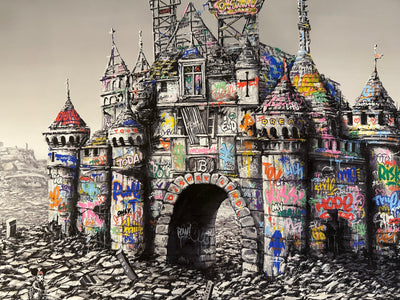
About Roamcouch
Ryo Ogawa, better known as RoamCouch was born in Gifu, Japan in 1976. He is a street artist. He began to draw in his childhood, influenced by Japanese comics, and started working as a designer at the age of 18.
Afterwards, he was diagnosed with a serious illness, which made him rethink his life and career and he subsequently made up his mind to become an artist. In 2011, now dubbed “RoamCouch”, he began his transition into a full-time artist.
He produces his exquisite and romantic works of art by using over fifty different layers of hand cut stencil, and has been showcased at solo and group exhibitions both within and outside Japan. His detailed and rich stencil paintings redefined the stereotypical image of stencil art.
In 2014, he opened his first solo show titled “A Beautiful Life” in New York and achieved an amazing feat of selling out the entire collection.
RoamCouch started a project named “Emotional Bridge Project” in 2014 and has painted murals voluntarily to revitalize his hometown. His aim is to attract art fans to his hometown by publicly exhibiting his works of art.
Calling his new style “Neo Ukiyo-e”, RoamCouch works on art pieces to clearly indicate Ukiyo-e of modern times by blending stencil art with Japanese handmade paper “Mino washi”.
34.0" x 24.0" in
(87 x 61 cm)
- Year: 2020
- Rarity: Limited edition
- Support: Hahnemühle Photo Rag paper
- Medium: Giclée printing
- Year: 2020
- Rarity: Limited edition
- Support: Hahnemühle Photo Rag paper
- Medium: Giclée printing
This limited edition print of 24" x 34" in by Jeff Gillette and Roamcouch presents a striking, dystopian reimagining of the Disney castle, juxtaposing elements of whimsy with a somber, post-apocalyptic landscape.
The castle, typically a symbol of fantasy and childhood dreams, is rendered here with an intricate overlay of urban decay. The walls are a chaotic medley of vibrant graffiti and vivid colors, standing in stark contrast to the grayscale environment that surrounds it.
This infusion of street art not only invigorates the structure but also suggests themes of rebellion and resilience amidst desolation. The background, a desolate expanse of rubble and ruined edifices, sets a foreboding tone, reinforcing the thematic undercurrent of decay. The sky overhead is a gradient of bleak grays, enhancing the somber atmosphere that permeates the piece.
The artist expertly utilizes this stark contrast between the lively, defaced façade of the castle and the monochromatic wasteland to evoke a sense of lost glory and enduring creativity in the face of ruin.
This artwork captures a narrative that is both cautionary and hopeful. It challenges the viewer to reconsider notions of permanence and beauty, suggesting that even in the darkest of times, creativity and expression cannot be wholly extinguished.
The meticulous detail with which the castle is adorned, coupled with the oppressive bleakness of its surroundings, creates a powerful visual commentary on the resilience of human spirit and imagination.

About Roamcouch
Ryo Ogawa, better known as RoamCouch was born in Gifu, Japan in 1976. He is a street artist. He began to draw in his childhood, influenced by Japanese comics, and started working as a designer at the age of 18.
Afterwards, he was diagnosed with a serious illness, which made him rethink his life and career and he subsequently made up his mind to become an artist. In 2011, now dubbed “RoamCouch”, he began his transition into a full-time artist.
He produces his exquisite and romantic works of art by using over fifty different layers of hand cut stencil, and has been showcased at solo and group exhibitions both within and outside Japan. His detailed and rich stencil paintings redefined the stereotypical image of stencil art.
In 2014, he opened his first solo show titled “A Beautiful Life” in New York and achieved an amazing feat of selling out the entire collection.
RoamCouch started a project named “Emotional Bridge Project” in 2014 and has painted murals voluntarily to revitalize his hometown. His aim is to attract art fans to his hometown by publicly exhibiting his works of art.
Calling his new style “Neo Ukiyo-e”, RoamCouch works on art pieces to clearly indicate Ukiyo-e of modern times by blending stencil art with Japanese handmade paper “Mino washi”.
Contact us
Have a question, or want a product recommendation? Get in touch.
